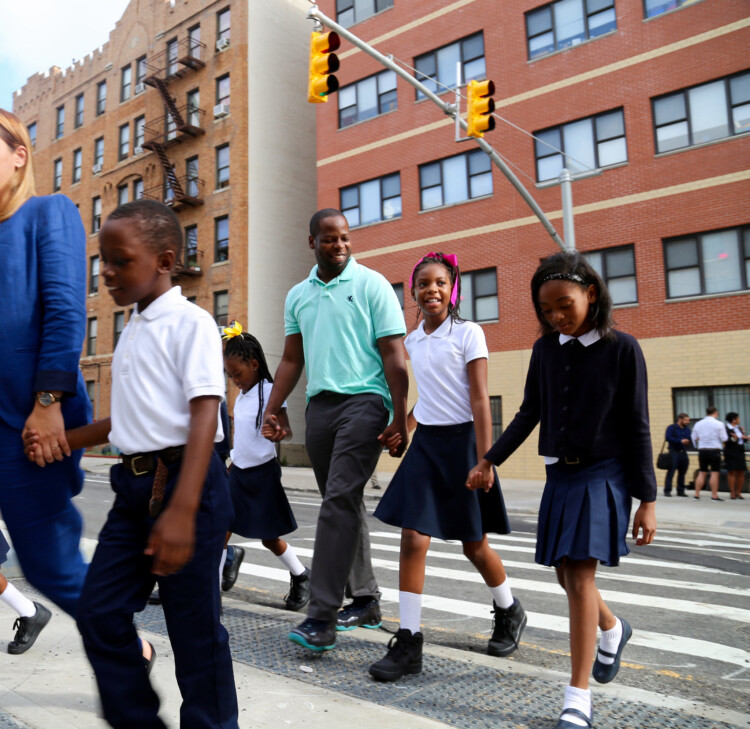The William T. Grant and Spencer Foundations today announced three new Rapid Response Research grants to support collaborations between researchers and policymakers, with the central goal of reducing inequality in youth outcomes in the United States. These grants synthesize existing research to inform smart public policy that can positively impact the lives of young people. All told, the two foundations have joined to support five such grants since June 2019, totaling nearly $600,000
As the COVID-19 pandemic continues, resource shortfalls and disruptions to education and social programs will compound existing inequalities among children and youth. The first of the three grants awarded today will support UnidosUS and the Institute for Child, Youth, and Family Policy at Brandeis University as they strive to ensure that the children of immigrants are included in safety net programs and post-pandemic recovery efforts. The second grant will bring together the City University of New York Urban Food Policy Institute and Hunger-Free America to address food insecurity among children and youth as a result of the pandemic. The third grant, to be managed by Education Trust, will tackle two pressing education-related policy issues related to COVID: Education Trust and MDRC will explore strategies to bolster student learning due to the pandemic; and Education Trust will partner with Brown University to synthesize research on recession-induced teacher layoffs.
The Foundation developed the Rapid Response Research awards to foster agile uses of research to respond to the needs of young people growing up in an uncertain and turbulent social climate. In 2020, the Foundation devoted nearly the entire budget of this grant program toward work that is specifically designed to reduce inequality and improve the youth outcomes amid the changing social contexts in the U.S. during the COVID-19 pandemic.
The cornerstone of the program is collaboration between researchers and policymakers. The researchers commit to synthesizing the relevant literature within an abbreviated timeframe of six to eight weeks, and both the policy and research partners develop an engagement plan to ensure that the research yields action. The swift, systematic review of existing research is jointly designed by both partners to ensure that the questions guiding the synthesis are responsive to real information needs of decision makers.
The newest Rapid Response Research grantees are:
Including Children of Immigrants in the Post-Pandemic Economic Recovery Efforts and Safety Net
Dolores Acevedo-Garcia and Pamela Joshi, The Institute for Child, Youth, and Family Policy, Brandeis University, and Emily Ruskin, Senior Policy Advisor, UnidosUS
UnidosUS and the Institute for Child, Youth, and Family Policy seek to leverage a unique policy window to ensure that the children of immigrants are included in safety net programs and post-pandemic recovery efforts. Since the 1996 welfare reform, children in immigrant families, the majority of which are US citizens by birth, have been increasingly excluded from social programs, extending to the 2020 CARES Act. Given ongoing policy deliberations over pandemic-related relief efforts, the impending start of the next presidential term, the recent National Academies report A Roadmap to Reducing Child Poverty, and the national reckoning on racial and ethnic inequality, there is an opportunity to reexamine immigrant restrictions in safety net policies. This effort will inform key federal policymakers about the effects of immigrant exclusions and promote the inclusion of children of immigrants in social policy and pandemic-related recovery measures. The research review will discuss: 1) the demographic, economic, and social importance of children of immigrants and their families; 2) the extent and effects of child poverty among children of immigrants; 3) how the exclusion of children of immigrants and their families has evolved since the 1996 welfare reform; 4) the effects of restrictions on immigrant eligibility and access to anti-poverty programs on the children of immigrants; 5) how the response to COVID-19 has maintained or deepened existing restrictions; and 6) policy principles that should guide immigrant eligibility and participation in anti-poverty programs moving forward. The research review will be accompanied by a policy review of federal anti-poverty policies. The partners will produce review products, such as reports and policy briefs and will engage in outreach and education efforts with policymakers, researchers, and civil society.
Expanding Food Benefits in Response to a Crisis: Lessons for the COVID-19 Pandemic
Nicholas Freudenberg, CUNY Urban Food Policy Institute, Research Foundation of the City University of New York, and Joel Berg, CEO, Hunger-Free America
As of April 2020, 40 percent of households with children 12 years of age or younger were food insecure, and millions of children and youth became food insecure as a result of the Covid-19 pandemic. In response, the federal government expanded the Supplemental Nutrition Assistance Program (SNAP), the Special Supplemental Nutrition Program for Women, Infants, and Children (WIC), and school food programs. Despite these expansions, only 15 percent of eligible children had received the expanded benefits by May and some states had not even begun to implement these policy changes. Given the urgent need to make food benefits available to low-income children and youth, the Urban Food Policy Institute and Hunger-Free America will partner to assist state and local policymakers and advocates with the implementation of these policy expansions to reduce food insecurity. The research partner will conduct a rigorous analysis of evidence of the effects of expanding public food benefits in response to emergencies, with a particular focus on state and local policy implementation. Focusing on SNAP, WIC, school meals, pandemic-EBT, and summer meals, the team will synthesize evidence on how programs were expanded, as well as barriers and facilitators to implementation and the impact of these expansions on child food insecurity. The evidence syntheses will be conveyed to policymakers and advocates in a variety of formats, including policy guides, webinars, and policy briefs. The partners will meet with policymakers to educate and assist them in policy implementation; and organize meetings, webinars, and virtual town halls to encourage the implementation of food policy expansions nationwide.
Making up for Unfinished Instruction and Equitable Recession-Induced Layoffs
Allison Rose Socol, Assistant Director of P-12 Policy, The Education Trust; Jean Grossman, Senior Fellow, K-12 Education Policy, MDRC; and Matthew Kraft, Associate Professor of Education and Economics, Brown University
The Education Trust (Ed Trust) will partner with Jean Grossman and Matthew Kraft to tackle two pressing policy issues related to the COVID-19 pandemic: unfinished instruction and recession-induced layoffs. Ed Trust and Grossman will synthesize the research on best practices to make up for lost learning time and advocate for efforts to ensure that districts serving low-income students and students of color implement these strategies to close educational opportunity gaps. They will build on a literature review that identified four promising strategies to bolster student learning in light of the pandemic: high dosage tutoring, expanded learning time, early warning systems to identify students having problems, and social-emotional learning interventions. Ed Trust and MDRC will explore the impacts of these strategies on students from low-income backgrounds, students of color, and English language learners; the resources needed to implement these practices; and barriers and facilitators to successful implementation. Ed Trust will share promising expanded learning time strategies with national educator organizations, civil rights groups, and parent associations. They will also educate state and local policymakers and practitioners about the review findings and conduct virtual meetings and webinars to inform the equitable allocation of resources to implement these strategies.
For the second project, Ed Trust and Kraft will synthesize research on the effects of teacher layoffs after the Great Recession and advocate for local, state, and federal reduction-in-force policies that protect students of color and low-income students from being disproportionately impacted by layoffs. They will synthesize literature on reduction-in-force policies, their impacts on student achievement, and strategies for pursuing educator layoffs that mitigate negative consequences for underserved students. The synthesis will identify available policy options for determining which educators to lay off, and options for deciding which schools, grades, or subjects to protect from layoffs. The review products will offer districts guidance to mitigate the impact of educator layoffs and hiring freezes on students of color and low-income students. Ed Trust will partner with national educator organizations to inform federal policy by developing and implementing a coordinated campaign to advocate for additional federal stimulus funding. Advocacy efforts will also call for an equity-based distribution of funds that enables states and districts to prioritize high-need students in layoff decisions.





